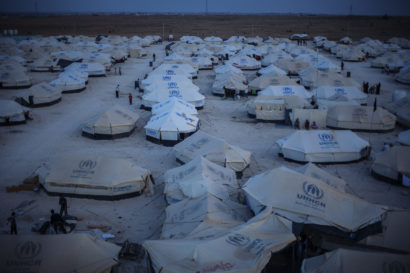Tag: migration
Solid waste and faecal sludge management in situations of rapid mass displacement are important to public health and providing for a better environment. Despite this, both have been neglected in WASH programmes, which tend to have a focus on water. However increasing efforts are being made to find solutions to challenges in solid waste and… Read more
This rapid review report has identified the wastewater treatment plant (WWTP) options used in emergency settings, with decentralised wastewater treatment systems (DEWATS) and mobile wastewater treatment units performing most effectively and with minimal costs. Examples are taken from refugee camps and internally displaced people (IDP) settlements due to the Iraq war, the Israeli-Palestine conflict, and… Read more
A rapid review of the literature has found a selection of innovative WASH options available for situations of severe population overcrowding and limited spaces. Case study information was collated from African, Middle Eastern, South Asian and Caribbean countries. As requested, a number of experts were consulted for their opinion where there was a lack of… Read more
This report found that almost all of the information on education and migration from fragile and conflict-affected states (FCAS) deals with integrating refugees into schools, providing schools in refugee camps, and/or using education to promote peace and tolerance. This body of literature often includes the educational level and status of migrants, but does not examine… Read more
Spanning several continents and drawing on the stories of young migrants, Child Migration and Human Rights in a Global Age provides a comprehensive account of child migration and child trafficking. It looks at the obstacles placed in the paths of adolescents fleeing war, exploitation, or destitution; the contradictory elements in the approach to international adoption; and… Read more
Remittances are an important strand in the relationship between migration and social change in migrants’ countries of origin and there is increasing interest in the role of remittances in conflict and post-conflict countries. Yet little is known about remittances from the diaspora perspective, and much less about refugees remitting. This paper makes three contributions, based… Read more
This briefing considers the different ways in which one can understand who counts as a migrant in the UK and the implications of using different definitions. Definitions of ‘migrant’ vary among different data sources, and between datasets and law. Among other possibilities, migrants may be defined as foreign-born, foreign nationals, or people who have moved… Read more
This study explores the impact of the brain drain on a source country’s welfare and development, which can either be beneficial or harmful. The evidence suggests that there are many more losers than winners among developing countries. Whether a country gains or loses depends on country-specific factors, such as the level and composition of migration,… Read more
This paper synthesizes and extends recent research on “The New Economics of the Brain Drain”. In a unified framework, the paper shows that while recently identified adverse repercussions of the brain drain exacerbate the long-recognized negative impact of the brain drain, longer-term consequences turn the brain drain into the harbinger of powerful gains. These gains… Read more
A better understanding of the relationship between HIV and human mobility in southern Africa is essential for the development of appropriate measures for HIV prevention, treatment, care and support to reduce HIV vulnerability among host communities as well as migrant communities. The aim of this document was to identify, assess and document emerging best practices… Read more








